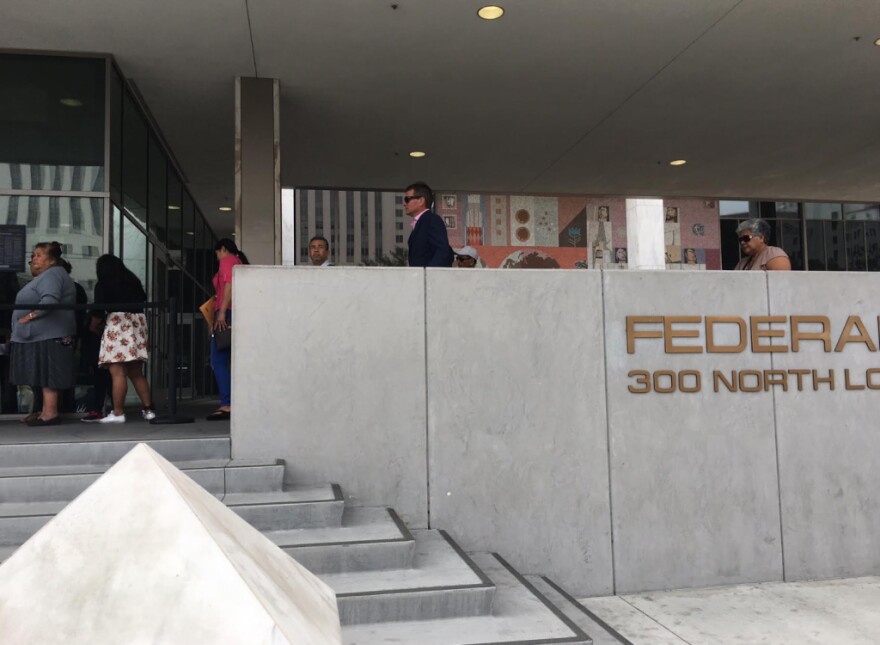This story is free to read because readers choose to support LAist. If you find value in independent local reporting, make a donation to power our newsroom today.
This archival content was originally written for and published on KPCC.org. Keep in mind that links and images may no longer work — and references may be outdated.
Deportation cases, once closed now reopened, up more than 60 percent in LA

The number of once-closed deportation cases that have been reopened since Jan. 20 has jumped sharply since President Trump took office, worrying many unauthorized immigrants who had been reassured they could stay in the country if they remain out of trouble.
Some had their deportation cases put on hold during the Obama years under what was termed "administrative closure" and would only need to check in periodically with immigration officials. Some even obtained work permits.
The policy applied starting in 2011 to certain unauthorized immigrants who had deep ties to the U.S., including relatives who are American citizens, lived many years in the country and did not present a criminal or national security threat.
But under the Trump administration, the cases that have been reopened grew by more than 70 percent nationwide, according to federal immigration court officials, and such cases are up more than 60 percent in Los Angeles.
The change in policy worries immigrants like Miguel, a 40-year-old father of three from East Los Angeles, who asked his last name not be used because of his legal status.
On a recent morning, he made his way to a downtown L.A. federal building for his annual check-in with U.S. Immigration and Customs Enforcement, nervous about what could happen.
“I’ve heard that some people who come in to report, they don’t come out. They come out handcuffed," he said in Spanish.
Miguel came to the attention of immigration officials several years ago, when he was stopped for a broken tail light. But he has lived in the U.S. for more than two decades, raised a family here, and maintained a clean record. All of this worked in his favor in 2014, when his attorney persuaded ICE officials to administratively close his deportation case.
Since then, Miguel has checked in with ICE once a year. He had been fairly confident each time that things would go well, but he knows that immigration policies are changing.
“You come here worried, worried that something is going to happen to you," he said.
IMMIGRANTS FEAR CHECK-INS
Check-ins with ICE have become fraught events for immigrants who in the past were deemed a low priority for deportation. Some have final removal orders, but did not commit any crimes. Others, like Miguel, don’t have final deportation orders because their cases were closed. They were allowed to stay on so long as they checked in as required.
People considered low priority were detained at times during the previous Obama administration, too. But until recently, immigration officials typically reopened shelved cases only if the person had been arrested or convicted of a crime.
"With President Obama, the priorities for deportation enforcement were switched," said Alma Rosa Nieto, a Los Angeles immigration lawyer representing Miguel. "He wanted to go after the hard-core criminals, people that were a risk to national security."
But the Trump administration reordered those priorities to include anyone who is in the country illegally. As a result, closed cases — even those without a criminal link — are being reopened, said Daniel Kowalski, an attorney and publisher of the online Bender's Immigration Bulletin, which tracks immigration legal news.
“With few exceptions, it is not related to anything new or different in the client’s life other than this new emphasis on numbers and statistics and enforcement," Kowalski said.
ICE officials said criminals are still a priority, but consistent with the Trump administration’s policies, any closed case may be reopened.
"Thus, it is possible that during a regular review, a case involving a non-criminal alien might be re-calendared," ICE officials told KPCC in an emailed statement.
Nationwide, there were 1,656 reopened cases between Jan. 20 and May 31 of this year, up from 966 a year ago. In Los Angeles, reopened cases jumped to 475 from 292 during this same period.
Federal immigration court officials said the data does not distinguish between cases that may have been reopened because of the commission of a crime and those that were not.
Putting the once-closed cases back on the docket has a ripple effect in the already backlogged immigration court system, said Kowalski of Bender's Immigration Bulletin.
“They can’t hire judges fast enough to keep up with the amount of cases they are putting into the pipeline," he said.
According to the National Association of Immigration Judges, roughly 325 immigration judges are handling almost 600,000 open immigration cases nationwide. Reopening closed cases adds to an already staggering workload, said Judge Dana Leigh Marks, head of the judges' union.
“It’s going to be the drip, drip, drip of Chinese water torture for us immigration judges," Marks said. "It may not be a huge amount of cases, but it’s just one more group of cases that we thought we had dispensed with, at least for a period of time.”
Miguel had hoped his case would remain closed another two years, long enough for his eldest daughter to turn 21 and sponsor him for a green card. He worries he may not have enough time now.
But the other day, he came bouncing out of the ICE downtown office with a big smile on his face — the computer system was down, and he was sent home.
“I’m relieved that nothing happened," Miguel said. "It’s not quite a year, but at least nothing happened. I can go back to my home and my work, like normal.”
He's due back in October.







